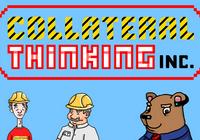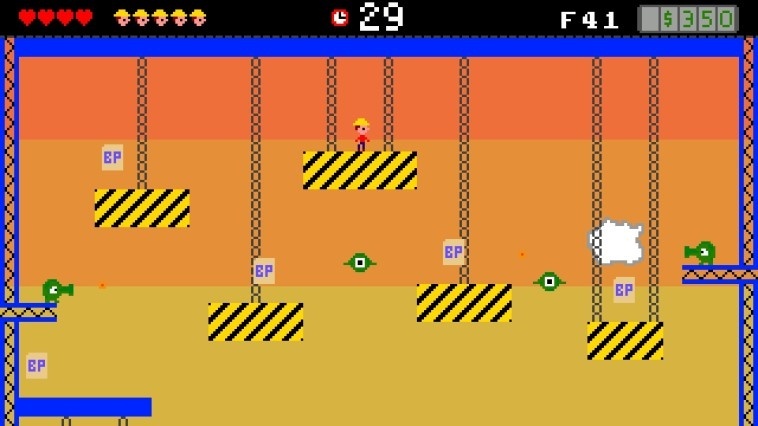Collateral Thinking (Wii U) Review
By Brandon (Michael) Howard  19.08.2016
19.08.2016

The first game from the upstart one-man studio Astrosaurus Games, Collateral Thinking is a retro platformer that wouldn't feel out of place in an 80s arcade. It's bright, it's colourful, and it's got all the stylings of an old-school action platformer, with visuals to match. While Nintendo owes a lot of their present day success to similar titles from back in the day, Collateral Thinking has arrived in a different age, and it shows.
From the first few seconds on the screen, it's evident that Collateral Thinking has a lot going on. The visuals are startlingly bright, pixelated, and look straight out of a retro cartridge. The chiptune soundtrack is busy and promises to be vaguely stuck in heads everywhere. The main game can be started straight from there, but it's worth mentioning the slight bit of story beforehand.
Collateral Thinking gets its moniker from the in-game construction company of the same name. With no job being too big, no deadline being too soon, and no billionaire being too egocentric, duo Barrett and Grin will take on anything, for the right price. It's a cute little addition, but it's hard to feel like the segment couldn't have just been included in the game proper, even spread out across a few levels.
The story may not be much, and unfortunately, the gameplay doesn't have a whole lot to offer, either. It feels very reminiscent of Donkey Kong, although lacking in said title's tight controls and fluid levels. Instead, Grin feels slick and floaty to control, and the platforming doesn't really feel that good. The controls aren't helped by wonky lags that occasionally slow down the screen, either.

The levels themselves vary in goal and design, and this is where Collateral Thinking starts to feel extremely messy. Each level has one of three goals, either defeat all the enemies with a tool acquired in that stage, survive for the duration of the time limit, or collect all the blueprints on the level. The objective briefly flashes on the screen before each level, and then it's time to start.
With a 30-second countdown, it's important to get a move on quickly. On survival stages, it's less of an issue, but finding a safe spot still requires a bit of quick action before Grin becomes overwhelmed with enemies. "Bust" stages first require Grin to get a tool from a box before he actually can defeat any enemies, and the blueprint stages have several sheets scattered across the stage.
Unfortunately, the controls don't really help the frantic pace so much as hinder it. Grin simply doesn't feel good to control, and that's a big shot to level at a title in a genre so heavily affected by its controls. The constant objective changing doesn't help, but it's really not all that far off. Separating the gameplay sections might have helped, but the whole experience just comes across as feeling frustrating.

Cubed3 Rating
Bad
Collateral Thinking doesn't suffer from a lack of variety so much as it suffers from its excess. The goals in each level are constantly changing, and with only 30 seconds per level, it feels like a mad rush to get moving, which is counterintuitive to how the sticky controls dictate the pace of play. The levels sort of work when confined to one specific design, but the constant jumping between objectives is annoying at best and frustrating at worst.

![]() 5/10
5/10
![]() 0
(0 Votes)
0
(0 Votes)
 Out now
Out now  Out now
Out now  None
None  Out now
Out now Comments
Comments are currently disabled

 Sign In
Sign In Game Details
Game Details Subscribe to this topic
Subscribe to this topic Features
Features






 Top
Top

